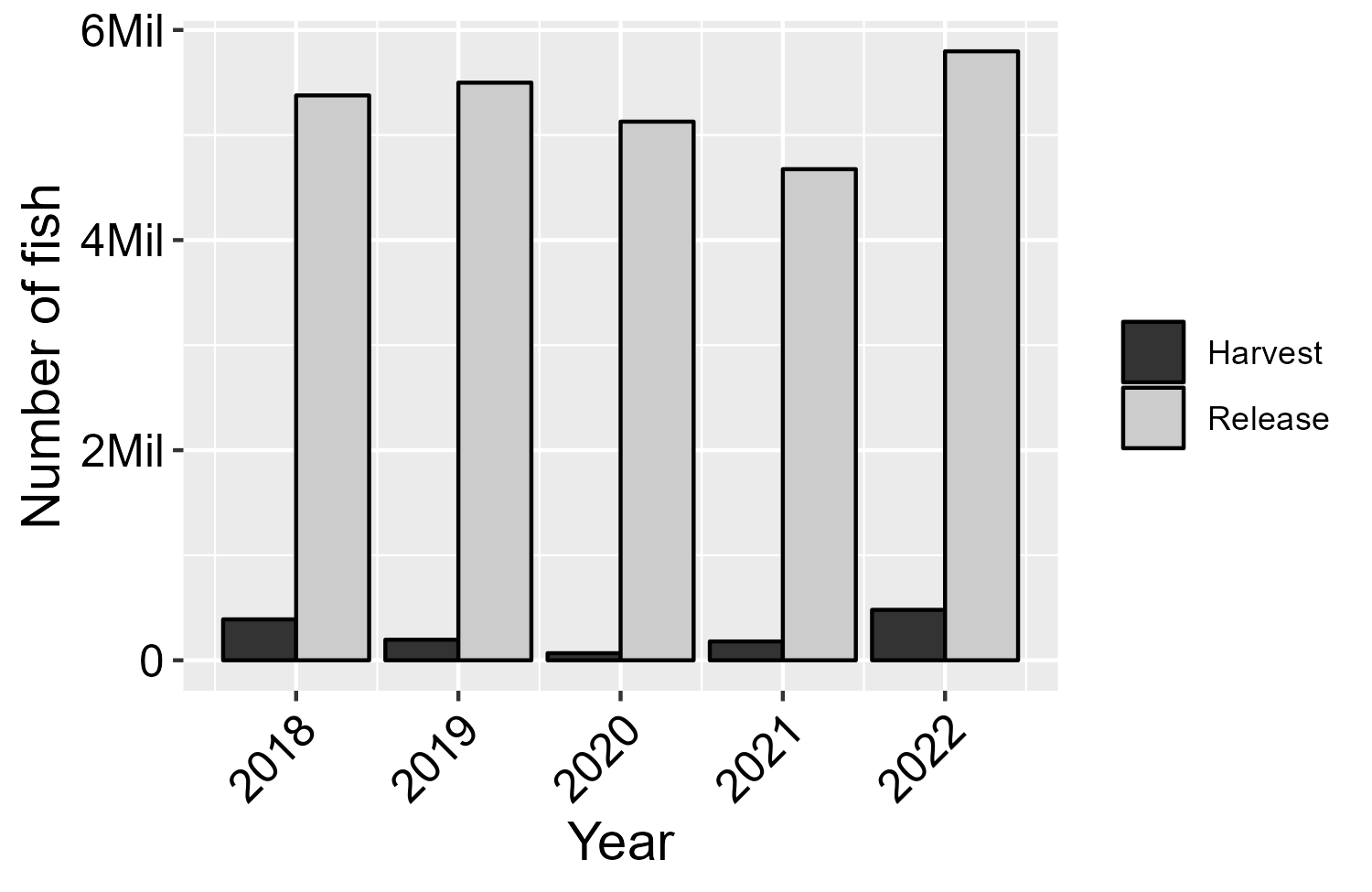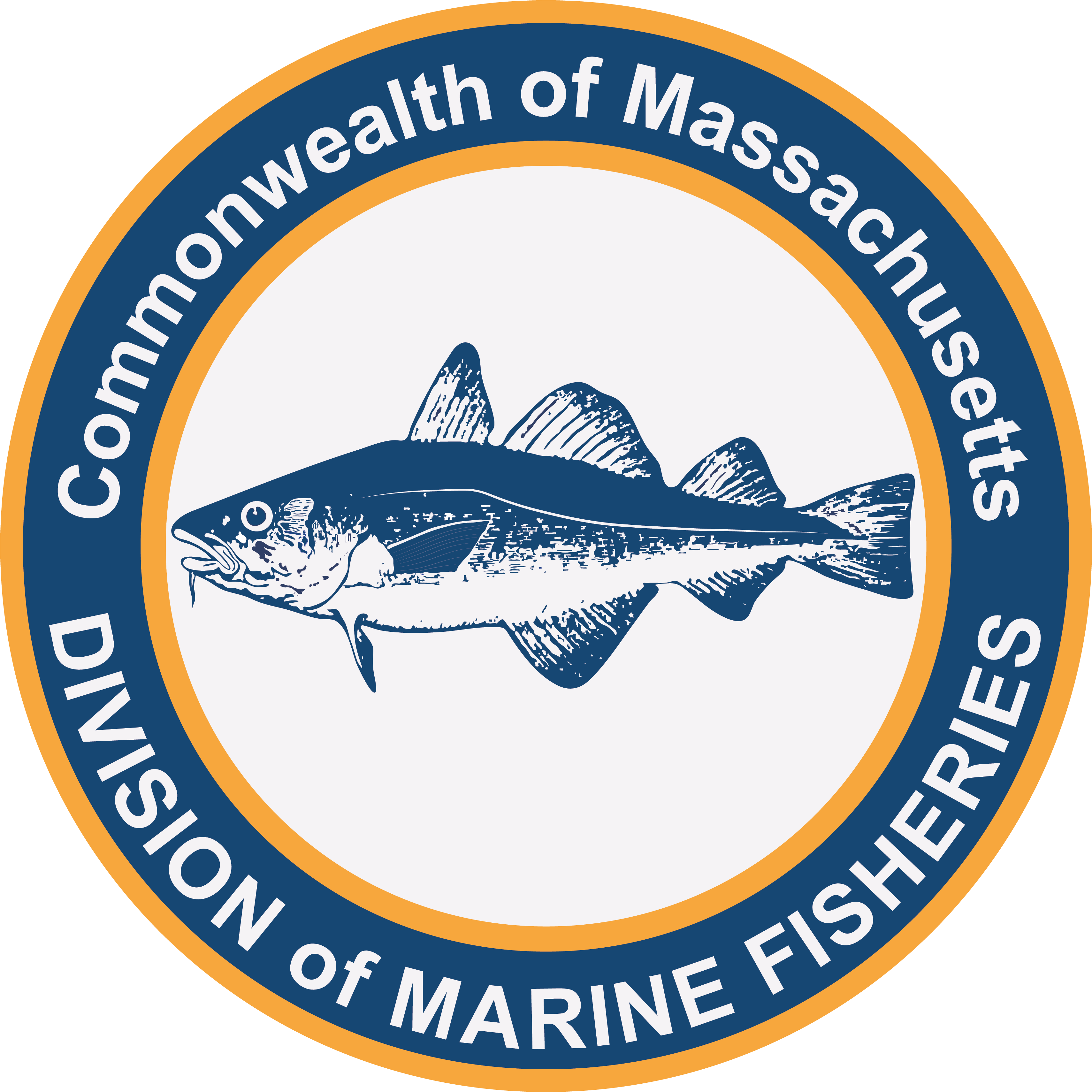- Division of Marine Fisheries

The Commonwealth of Massachusetts offers some of the finest recreational fishing on the east coast and a wide diversity of species for anglers to pursue. This is, in part, because the coast straddles two ecological regions divided by Cape Cod. Cold water species like cod, haddock, pollock, and winter flounder to the north, warm water species such as scup, black sea bass, and summer flounder to the south. This means that a party boat angler could jump on a trip out of Gloucester for haddock, pollock, or even halibut on one day and then leave from the South Coast and spend the day fishing for scup, black sea bass, and fluke. However, global climate change is changing our coastal waters quickly and fishing opportunities are changing with them. This includes the reduction of many cold-water fisheries like winter flounder and cod and the emergence of warmer water species like black sea bass that are increasing in abundance throughout Massachusetts waters. In this article, we will review the recent trends for some of the most popular and pursued recreational fish and discuss some of the most notable fisheries of 2022 with an eye towards the 2023 fishing season.
The most popular and pursued species in Massachusetts are striped bass, summer flounder (fluke), scup, black sea bass, and haddock. All these species have accessibility in common; they are mostly fish that are present in waters close to shore throughout all or great parts of the coastline. Haddock almost always require a boat trip, but they have been very abundant throughout Massachusetts and most find them a meal well worth a day on the water. Excellent eating is another common theme for these fish and catching, cooking, and sharing them with family and friends can be a much more rewarding experience than paying at the fish market for some filets (although this is a great option in a time crunch too). Black sea bass, fluke, and haddock are all sweet and light fleshed fish that can be prepared in many delightful ways. Many of these fish are also a great deal of fun to fish for. Black sea bass, scup, and haddock can all make for an action-packed outing while fluke can inspire intense devotion to fishing and fighting technique. Striped bass offer the complete package with opportunities for non-stop action to finely honed techniques to catch an elusive fish in the 40 to 60 lb. range.
The striped bass fishing during 2022 was very good to excellent throughout Massachusetts, and this resulted in the highest amounts of harvested and released striped bass in recent history (Figure 1). Beginning in early March, smaller holdover bass were available in several areas and smaller migrating bass began arriving on the South Coast by mid-April. By mid-May, larger bass were in Massachusetts waters, feeding on squid, menhaden, seaworms, and silversides. Over the course of the season, two areas were exceptional: Cape Cod Bay and the rips off Monomoy. There were large schools of menhaden from Plymouth to Boston Harbor and big striped bass were feeding on them all summer long. Anglers live-lining menhaden landed and released many bass above 40 inches. The striped bass fishing off Monomoy was almost as good. These fish were smaller in size compared to those in Cape Cod Bay but were just as abundant. Anglers had plenty of action using a variety of lures ranging from top water plugs to flies. Part of this exceptional fishing was driven by abundant 2015 year-class of Chesapeake Bay spawned striped bass and this ideal fishing led to a coastwide doubling of harvest (see article on striped bass emergency action).
In the waters of southern Massachusetts, the inshore trio of fluke, scup, and black sea bass provide consistent opportunities for boat and shore anglers. The black sea bass fishing over the past several years has been consistent. Many anglers remember 2021 for fantastic catches of black sea bass, especially in Buzzards Bay, but there has been some decline in the abundance of larger fish and the overall number of sea bass caught since then. Anglers fishing in Nantucket Sound and Buzzards Bay during May and June usually returned home with respectable bags. As the seasons progressed and the fish dispersed after spawning, anglers had to target deeper wrecks or rock piles to find legal sized black sea bass.
Scup fishing in Massachusetts over the past five years has been exceptional with Massachusetts anglers typically catching between 4 and 6 million scup every year. During the spring and early summer, anglers found large concentrations of scup covering almost every rocky bottom. Several two-pound scup were weighed in the state derby each of the past few years, with winning fish close to three pounds. During this time of year, shore fishermen were also getting in on the action, as keeper sized scup were found in-shore in relatively shallow areas. As our coastal waters warmed, larger fish moved to deeper cooler waters, but lots of smaller fish were still found in suitable shallow water habitats. Scup is considered great table fare, especially among immigrant communities of Massachusetts. For many anglers, harvesting abundant scup, often readily available from boat or shore, is an important source of “locally caught” protein. Not to mention they are fun to catch, while spending time outdoors!
The fluke fishing in recent years has been more difficult than sea bass or scup. There have been good numbers of sub-legal fish around, but finding keeper sized fish can be tricky. This is not uncommon for fluke fishermen and persistence was key to successfully landing a keeper sized fluke when fishing inshore. Anglers fishing the deeper areas around the Elizabeth Islands were rewarded with some decent sized fluke. The fishing further offshore around Nantucket continues to be reliable, with many fish weighing in the double digits being boated each year.
Over the past 5 years, anglers have enjoyed above average fishing for haddock in waters off Massachusetts. Haddock can be found in many different areas in the Gulf of Maine from inshore spots in Cape Cod Bay to as far as Jeffries Ledge and Tillies Bank. Be sure to check out the DMF haddock guide and use the monthly maps when targeting haddock to maximize haddock catch and avoid cod. If you find yourself catching more cod than haddock in a particular spot, make a quick move to keep cod catches low. While haddock were in very high abundance and available in areas of around 100 feet of water for several seasons, the catch has not been as high in the last two years and fish are now often found in water over 200 feet. It takes a little more work to reel fish up from these depths, and many anglers make use of setups using braid to reduce drag and improve fishing. Another good tip is to use baited hooks instead of jigs when targeting haddock as they increase haddock catch while reducing the catch and wounding of cod.
As the 2023 fishing year gets under way, many anglers in Massachusetts are already enjoying what appears to be another great year. Striped bass, haddock, scup, and black sea bass fishing have been exceptional to solid and fluke fishing is picking up. DMF encourages anglers to get out on the water and enjoy the great recreational fishing opportunities available while also making sure to be aware of the new regulations on size and bag limits that can be found in our Guide and on the DMF website. Catching your own dinner is incredibly fulfilling and a great source of healthy food, but when you aren’t planning to keep a fish make sure to handle the fish with care and keep them in the water as much as possible so they can be caught and enjoyed another day.
By Recreational Fisheries Program staff
